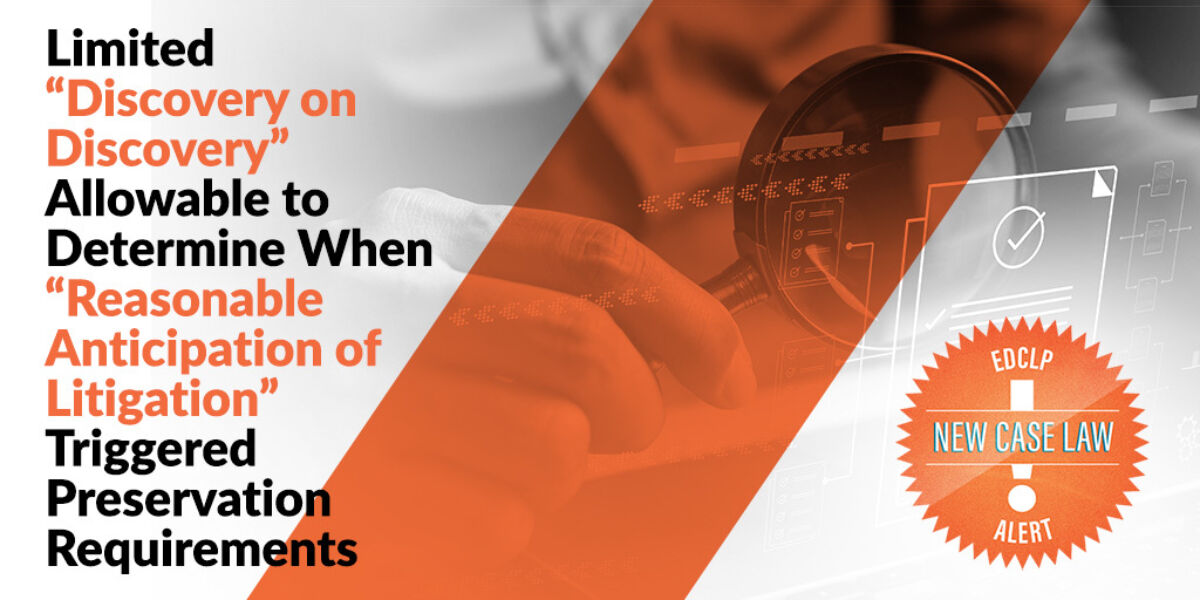E-Discovery
Limited “Discovery on Discovery” Allowable to Determine When “Reasonable Anticipation of Litigation” Triggered Preservation Requirements

Linet Americas, Inc. v. Hill-Rom Holdings, Inc.,
2023 WL 9119836 (N.D. Ill. Dec. 1, 2023)
Why This Case is Important
While courts are generally not inclined to indulge in meta-discovery (or “discovery on discovery”), out of concern for the principle of proportionality, there are limited occasions—such as determining when the duty to preserve arose—that may be allowable
Case Overview
In this antitrust case alleging that defendant, a medical technology supplier, engaged in a scheme to force hospitals into exclusive agreements, the defendant became aware that ESI from four former employees of the plaintiff was lost after employees stopped working. defendant sought “discovery on discovery” to learn when plaintiff reasonably anticipated litigation with defendant, thereby triggering the obligation to preserve said ESI.
According to plaintiff, the four employees stopped working in August 2018, October 2019, and December 2019. Its regular business practice was to delete data within three months of their departure—or at the latest by April 2020, when plaintiff switched to a new, cloud-based email system.
However, plaintiff had retained the law firm that filed the suit in January of 2020. Defendant claimed that the fact that disposal of the former employees’ ESI was “coincident with [plaintiff’s] retention of counsel handling this case” justified limited discovery into whether the ESI should have been preserved under plaintiff’s obligation to preserve data once it reasonably anticipated litigation.
Case Ruling
- Discovery on Discovery Acknowledged. The court found that defendant’s requests were allowable because meta-discovery “can be appropriate… when one party’s discovery compliance has reasonably been drawn into question.” Since plaintiff acknowledged the loss of the ESI, the court found there was an “adequate factual basis” to allow the line of inquiry.
- Plaintiff’s Duty to Preserve. Plaintiff argued that the duty to preserve arose when “litigation was imminent,” the 2015 FRCP amendments set forth a standard of when “litigation is commenced or reasonably anticipated.” Since “in large part plaintiffs control the timing of litigation,” their decision to retain counsel in January 2020 and failure to preserve ESI after that date provide a “sufficient factual basis to explore what steps were taken to preserve those records and why they no longer exist.”
- “Narrowly Tailored” Meta-Discovery Allowed. The court ordered plaintiff to produce its retention letter with the law firm and a log of their communications with the firm, a request “narrowly tailored” to determine when plaintiff anticipated litigation. It also required plaintiff to produce retention policies in effect from December 2019 to April 2020, while disallowing requests for retention policies prior to these dates, despite defendant’s allegation that plaintiff was aware of the contracts at question as early as 2013.
Case Law Tip
Unsure about the Uniform Spoliation Standard? Exterro has produced an infographic that can help you determine if sanctions might apply. Download it today!
Legal Analysis
Different courts have applied different standards to when a duty preserve evidence arises—ranging from when litigation is “foreseeable” to when litigation is “imminent.” Perhaps the most commonly applied standard, however, is when litigation is “reasonably anticipated.” Where parties consult with counsel about filing suit, and that leads to filing, it can be hard for them to argue that they did not reasonably anticipate litigation at the time of the consultation. While courts disfavor “discovery on discovery,” most courts will allow limited discovery to inform when litigation was reasonably anticipated in a situation where spoliation of evidence is reasonably suspected.